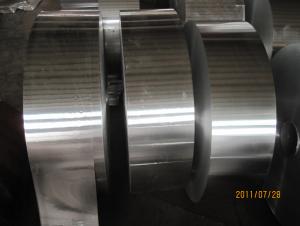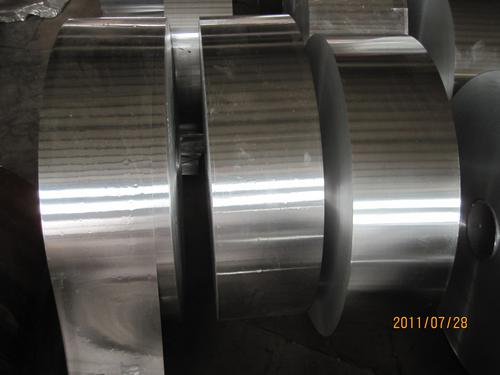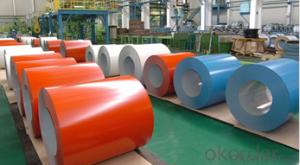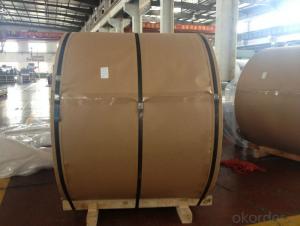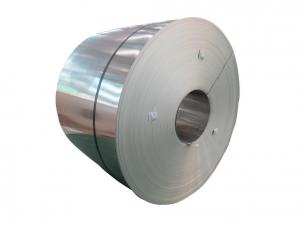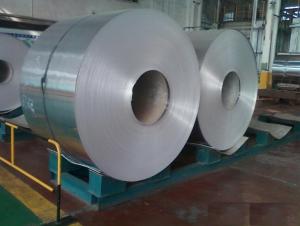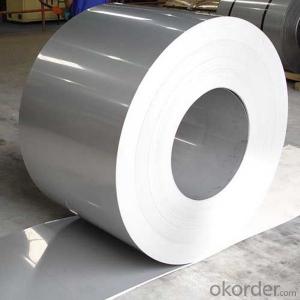Roll of Aluminum Coil - Continuous Casting Aluminium Strip AA1050 H14
- Loading Port:
- China Main Port
- Payment Terms:
- TT or LC
- Min Order Qty:
- -
- Supply Capability:
- -
OKorder Service Pledge
OKorder Financial Service
You Might Also Like
1.Structure of Product Description
DC Aluminium Strip in Coil is one semi-finished aluminium material. This strip can be rolled down to aluminium coil,sheet,circle ect. The alloy AA1050 is widly used in building, industry ect. Its weight is much lower than steel. So many customers choosed aluminium material instead of steel.
2. Main features of the product
a.Competitive price---We have our own aluminium ingot mills in China,so we have better price control system.
3. Image 4.Product Specification 5.FAQ: What is the quality standard? ---Usually our standard is GB3880-2006
b.Professional after-sale service---We have more than 15 years exportation experience.
c.Fast delivery time---Usually our delivery time is about 30 days.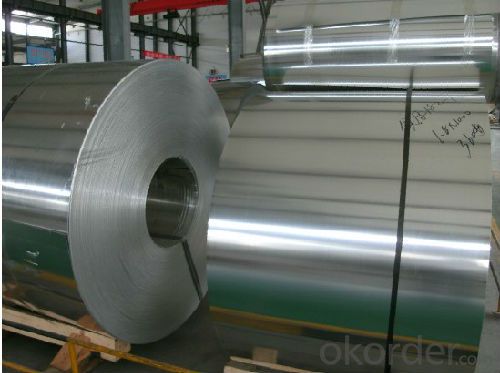
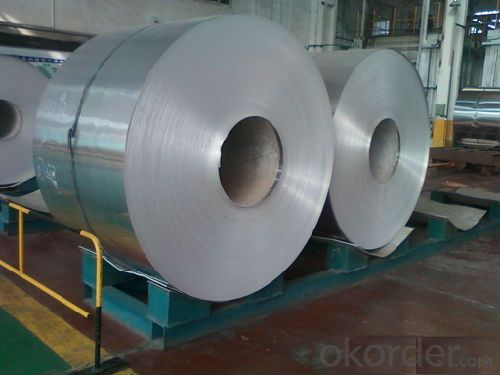
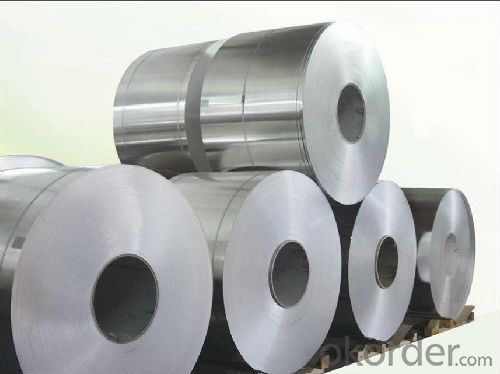
Alloy Temper Thickness Coil ID Coil Weight AA1050 H14 0.2MM-3MM 505MM Min 2 tons
What is the largest width?
---It is 2300mm
What is the MOQ?
---Usually we can accept 80 tons.
- Q: Related technical standards of aluminium coil
- GB/T 6453-1986 inhalation zirconium aluminum alloy composite stripGB/T 6452-1986 zirconium aluminum alloy powder for inhalationGB/T 3959-1994 industrial anhydrous aluminium chlorideGB/T 3151-1982, water purifying agent, aluminium sulfateGB/T 1871.3-1995 - Determination of aluminium oxide content in phosphorus ores and concentrates -- Volumetric and spectrophotometric methods
- Q: remember maybe a decade ago or so, copper used to be cheaper than aluminum. now it is the other way around, copper is more expensive. Even copper pennies cost more so I heard they are mixed with another metal to make a penny. What caused the change in value and when did it really start happening?In fact, copper has become valuble enough to steal. Some factories which have copper, have had their metals stolen, but outsiders who break into the factories to specifically take the copper. Then the factories started hiring security to prevent intruders from taking the copper.
- The two metals are a long way apart on the electro-chemical scale. This means that if they come into contact, a small - but significant - voltage will exist between them - completely independent of what currents are actually in the wires. This small voltage causes corrosion of both metals: not good!
- Q: What are the different elongation values of aluminum coils?
- The elongation values of aluminum coils can vary based on the specific alloy and temper of the aluminum. Generally, aluminum coils possess exceptional elongation characteristics, enabling them to undergo stretching or deformation without breaking. To illustrate, the frequently utilized alloy 3003-H14 typically exhibits an elongation value of approximately 20-30%. This implies that the aluminum coil can stretch up to 20-30% of its original length before reaching the point of fracture. Conversely, high-strength alloys such as 7075-T6 possess lower elongation values, typically ranging from 9-13%. These alloys are specifically designed for applications where strength is of utmost importance, albeit at the expense of sacrificing some elongation properties. It is worth noting that elongation values can also be influenced by the processing and treatment methods employed on the aluminum coils. For instance, annealing or heat treatment can enhance the elongation properties of specific alloys. In conclusion, the elongation values of aluminum coils can span from 9% to 30%, depending on the alloy, temper, and processing methods utilized.
- Q: Can aluminum coils be used for automotive body panels?
- Yes, aluminum coils can indeed be used for automotive body panels. In fact, aluminum is becoming increasingly popular in the automotive industry due to its many advantages. Aluminum is lightweight, which can contribute to improved fuel efficiency and overall performance of the vehicle. Additionally, aluminum has excellent corrosion resistance properties, making it a durable choice for automotive body panels. Moreover, aluminum can be easily formed and molded, allowing for intricate designs and better aerodynamics. Overall, the use of aluminum coils for automotive body panels is a viable option that offers numerous benefits.
- Q: What are the differences among various types of steel wires and their respective coiling techniques?
- <p>Yes, there are differences between different types of steel wires and their coiling methods. Steel wires can be categorized based on their composition, strength, and use, such as carbon steel, stainless steel, and alloy steel wires. Each type has unique properties that affect their coiling methods. For instance, carbon steel wires are strong and ductile, suitable for standard coiling techniques, while stainless steel wires offer corrosion resistance and may require special handling to prevent damage. The coiling methods also vary; some common ones include spool coiling, loop coiling, and pancake coiling. Each method has specific applications and considerations for wire diameter, tension, and storage. Understanding these differences is crucial for selecting the appropriate wire and coiling technique for a given application.</p>
- Q: Can aluminum coils be used in the aerospace industry?
- Yes, aluminum coils can be used in the aerospace industry. Aluminum is widely used in the aerospace industry due to its lightweight, high strength, and good corrosion resistance properties. Aluminum coils are commonly used in various aerospace applications such as aircraft fuselage, wings, engine parts, and structural components.
- Q: Are aluminum coils suitable for food processing and packaging?
- Yes, aluminum coils are suitable for food processing and packaging. Aluminum is a safe and hygienic material that is resistant to corrosion, odors, and moisture. It is commonly used for packaging food products due to its ability to maintain the freshness and quality of the food, preventing contamination and providing a longer shelf life. Additionally, aluminum coils are lightweight, flexible, and can be easily formed into various shapes and sizes, making them ideal for food packaging applications.
- Q: I am confused by that. One guy told me that he puts aluminium foil on his modem to receive the Internet better. Another guy told me that aluminium stops all kind of rays. What is correct?
- BOTH ARE CORRECT.... COVER THE WHOLE WIRELESS MODEM WITH ALUMINUM FOIL AND GROUND IT SHALL BLOCK ALL THE WIRELESS SIGNAL. CONNECT A SMALL PIECE FOIL TO THE WIRELESS MODEM ANTENNA MIGHT INCREASE THE RANGE A BIT SOME TIME BUT USUALLY NOT WORKING WELL.
- Q: Can aluminum coils be used in the production of aluminum cladding?
- Yes, aluminum coils can be used in the production of aluminum cladding.
- Q: Can aluminum coils be used in the production of solar reflectors?
- Yes, aluminum coils can be used in the production of solar reflectors. Aluminum is a commonly used material in the manufacturing of solar reflectors due to its high reflectivity and durability. The coils can be processed and shaped into the desired form for the reflector, allowing for efficient reflection of sunlight onto the solar panels. Additionally, aluminum is lightweight, making it easier to handle and install in solar reflector systems.
Send your message to us
Roll of Aluminum Coil - Continuous Casting Aluminium Strip AA1050 H14
- Loading Port:
- China Main Port
- Payment Terms:
- TT or LC
- Min Order Qty:
- -
- Supply Capability:
- -
OKorder Service Pledge
OKorder Financial Service
Similar products
Hot products
Hot Searches
Related keywords
